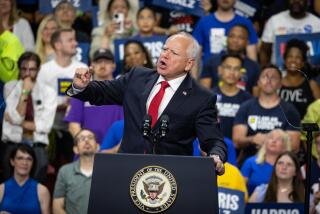Ex-ROTC Leader Says Clinton Deceived Him, Cheated Military
- Share via
The former Reserve Officer Training Corps commander who was thanked by Bill Clinton in a 1969 letter for “saving me from the draft” issued a scathing written statement Wednesday denouncing Clinton for deceiving him and “purposely defrauding the military.”
In his first extensive comments since the draft controversy erupted last spring, retired Army Col. Eugene J. Holmes accused Clinton of a “lack of veracity” when he failed to reveal his involvement in anti-war activities and “his counterfeit intentions” to join the ROTC.
Betsey Wright, a spokeswoman for Democratic presidential candidate Clinton, denied the colonel’s accusations and accused Clinton’s political opponents of “exploiting the failing memory of a fine military leader.” Citing published statements by Holmes from past years in which the retired World War II veteran said he did not recall details of the Clinton case, Wright asserted: “I believe someone has restructured his memory. . . . I don’t know who that was, but it saddens me.”
Among excerpts of Holmes’ prior published comments, provided Wednesday by the Clinton campaign, was an October, 1978, reference in the Arkansas Gazette reporting that Holmes “couldn’t recall Clinton’s case because there had been thousands of students since then.” And, in an October, 1991, Democrat-Gazette article, Holmes was quoted as saying of Clinton: “He was treated just like I would have treated any other kid.”
All of the stories cited by the Clinton camp appeared before the February, 1992, disclosure of Clinton’s 1969 letter to Holmes.
Holmes’ approval of an ROTC appointment for Clinton in the summer of 1969 had helped the young Rhodes scholar get a pending draft notice canceled. “We engaged in an extensive, approximately two-hour interview. . . . He was shrewd enough to realize that had I been aware of his activities, he would not have been accepted into the ROTC program as a potential officer in the United States Army,” Holmes wrote.
The four-page signed and notarized statement was prompted, Holmes said, by “the imminent danger to our country of a draft dodger becoming the commander in chief.” It was released by family members to some news organizations, including The Times.
Wright said that at the time Clinton agreed to join the ROTC program at the University of Arkansas in Fayetteville, it was his intention to serve. In previous statements, Clinton has said that it was immediately after signing up with the ROTC and getting his draft deferment that he had second thoughts. The deferment was dropped two months later after Clinton says he “put myself back into the draft.”
The Holmes statement adds little detail to what was previously known, but it reflects an anger that had not been revealed in his limited comments to the press. In February he had told the Wall Street Journal that he thought Clinton should have stayed in the ROTC because “he was backing out” of an agreement.
The written statement--dated Sept. 7, 1992, but released Wednesday afternoon--was particularly critical of the letter Clinton had written on Dec. 3, 1969, thanking him for saving him from the draft.
“I was not ‘saving’ him from serving his country. . . . I was making it possible for a Rhodes scholar to serve in the military as an officer,” Holmes wrote.
He charged that Clinton “purposely deceived me, using the possibility of joining the ROTC as a ploy to work with the draft board to delay his induction.”
Holmes said he also put Clinton’s 1969 letter in his ROTC file “so that a record would be available.” He said he thought “the letter alone would have restricted Bill Clinton from ever qualifying to be an officer in the United States military.”
Holmes said he issued his statement only after noting Clinton’s response to the most recent draft controversy. That controversy was prompted by a story in The Times which noted that despite Clinton’s claims that he had received no special treatment, his late uncle had lobbied successfully to get his induction notice postponed. Clinton complained afterward that everyone involved in the story, including his uncle, was dead.
Holmes wrote: “Since I may be the only person living who can give a firsthand account of what actually transpired (regarding the ROTC appointment), I am obligated by my love for my country and my sense of duty to divulge what actually happened and make it a matter of record.”
More to Read
Get the L.A. Times Politics newsletter
Deeply reported insights into legislation, politics and policy from Sacramento, Washington and beyond. In your inbox twice per week.
You may occasionally receive promotional content from the Los Angeles Times.










